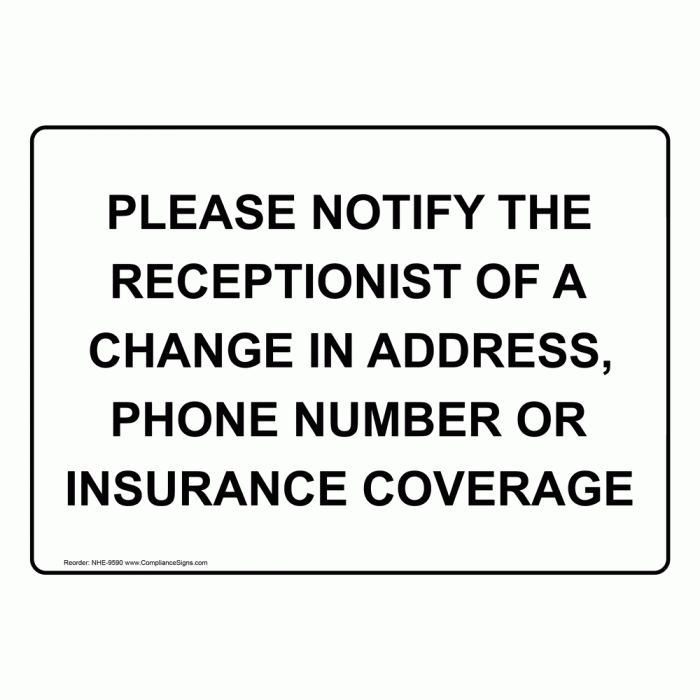In the dynamic world of insurance, the role of an unlicensed receptionist is pivotal in creating a seamless experience for customers and maintaining the smooth functioning of an insurance office. This guide delves into the essential qualities, skills, and strategies that can elevate an unlicensed receptionist to a valuable asset in the insurance industry.
As the first point of contact for customers, an unlicensed receptionist sets the tone for the entire interaction. Their professionalism, communication skills, and ability to handle inquiries and complaints play a crucial role in building customer trust and satisfaction.
Understanding the Role

Within an insurance office, an unlicensed receptionist serves as the first point of contact for clients and visitors, playing a crucial role in shaping the company’s image and facilitating smooth operations. Their responsibilities encompass a wide range of administrative and customer service tasks, demanding a blend of professionalism, confidentiality, and efficiency.
Essential Duties and Responsibilities
The core duties of an unlicensed receptionist in an insurance office include:
- Greeting and welcoming clients and visitors, creating a positive and welcoming atmosphere.
- Handling incoming phone calls, directing callers to the appropriate personnel or departments.
- Providing general information about the company, its products, and services.
- Scheduling appointments and maintaining calendars for insurance agents and other staff members.
- Processing and distributing mail and packages, ensuring timely delivery to intended recipients.
- Maintaining office supplies and equipment, ensuring a well-organized and functional workspace.
Confidentiality and Professionalism
In the insurance industry, maintaining confidentiality is of utmost importance. Unlicensed receptionists must adhere to strict protocols to protect client privacy and sensitive information. This includes:
- Keeping client information confidential, including personal details, policy details, and financial data.
- Handling sensitive documents and data with care, ensuring they are stored securely and accessed only by authorized personnel.
- Exercising discretion in conversations and avoiding discussing confidential information in public areas.
Professionalism is another cornerstone of an unlicensed receptionist’s role. They must maintain a composed and courteous demeanor, even under pressure, and strive to provide excellent customer service at all times.
Communication Skills

In the realm of insurance, exceptional communication skills serve as the cornerstone for effective interaction with clients and colleagues. These skills empower unlicensed receptionists to convey information clearly, resolve inquiries efficiently, and maintain harmonious relationships with all parties involved.
To excel in this role, one must possess the ability to articulate thoughts and ideas with clarity and precision, ensuring that messages are conveyed accurately and comprehensively. Active listening is paramount, enabling the receptionist to grasp the nuances of customer concerns and respond with empathy and understanding.
Handling Customer Inquiries
The ability to handle customer inquiries with finesse is a hallmark of an exceptional unlicensed receptionist. This involves understanding the customer’s needs, providing accurate and timely information, and resolving their concerns promptly. A proactive approach, coupled with a willingness to go the extra mile, can transform a routine inquiry into an opportunity to foster customer loyalty.
- Be a Patient Listener: Allow the customer to fully express their concerns without interruption.
- Demonstrate Empathy: Acknowledge and validate the customer’s feelings, showing that you genuinely care about their situation.
- Ask Clarifying Questions: Seek additional information to gain a comprehensive understanding of the issue at hand.
- Provide Accurate Information: Ensure that the information you provide is accurate and up-to-date.
- Offer Solutions: Proactively suggest solutions or alternatives to address the customer’s concerns.
- Follow Up: Follow up with the customer to ensure that their issue has been resolved to their satisfaction.
Resolving Complaints
Complaints are an inevitable part of any customer-facing role, and the manner in which they are handled can make all the difference in preserving customer relationships. An unlicensed receptionist should possess the skills to defuse tense situations, address complaints promptly, and work towards finding mutually agreeable resolutions.
- Stay Calm and Professional: Maintain composure even when faced with irate or upset customers.
- Listen Actively: Allow the customer to vent their frustrations without interruption.
- Acknowledge the Complaint: Express understanding and empathy for the customer’s concerns.
- Investigate the Issue: Gather all relevant information to determine the root cause of the complaint.
- Offer a Solution: Present a fair and reasonable solution that addresses the customer’s concerns.
- Follow Up: Follow up with the customer to ensure that the complaint has been resolved to their satisfaction.
Maintaining a Positive Attitude
A positive attitude is contagious and can create a welcoming and supportive environment for both customers and colleagues. An unlicensed receptionist who exudes positivity can turn even the most challenging situations into opportunities for growth and connection.
- Smile and Greet Customers: A warm smile and a friendly greeting can instantly put customers at ease.
- Be Helpful and Proactive: Offer assistance even before customers ask, and anticipate their needs.
- Resolve Conflicts Amicably: Approach conflicts with a positive mindset, seeking common ground and mutually beneficial solutions.
- Stay Positive Even Under Pressure: Maintain a positive outlook even when faced with challenging situations.
- Be a Team Player: Collaborate with colleagues to create a supportive and positive work environment.
Organization and Time Management
In the dynamic environment of an insurance office, organization and time management skills are crucial for unlicensed receptionists to handle multiple tasks efficiently and maintain a productive workflow.
Effective time management ensures that tasks are completed on time, priorities are met, and clients’ needs are addressed promptly. Organizational skills help maintain a clean and orderly workspace, which contributes to overall efficiency and productivity.
Prioritizing Tasks
- Identify high-priority tasks that require immediate attention. These may include urgent client inquiries, deadlines, or tasks that impact the overall functioning of the office.
- Create a daily to-do list and allocate specific time slots for each task. This helps visualize the workload and ensures that important tasks are not overlooked.
- Avoid multitasking when handling complex or time-sensitive tasks. Focus on one task at a time to maintain accuracy and efficiency.
Setting Deadlines
- Establish realistic deadlines for each task, taking into account the complexity of the task, available resources, and any potential obstacles.
- Communicate deadlines clearly to clients and colleagues to ensure timely completion of tasks and avoid misunderstandings.
- Monitor progress towards deadlines and adjust priorities if necessary to ensure that all tasks are completed on time.
Maintaining a Clean and Organized Workspace
- Maintain a clean and organized desk, free of clutter and unnecessary items. This creates a conducive work environment and facilitates easy access to essential documents and supplies.
- Use filing systems, folders, and labels to organize documents and records efficiently. This ensures that information is easily retrievable when needed.
- Regularly review and declutter the workspace to eliminate outdated or unnecessary items.
Knowledge of Insurance Products and Services
Understanding insurance products and services is essential for unlicensed receptionists in insurance offices. It enables them to provide accurate information and assistance to clients, answer inquiries effectively, and contribute to the overall efficiency of the office.
To stay updated on policy changes, premium rates, and coverage options, receptionists should:
Continuously Learn
- Attend company training programs and workshops to stay informed about new products and services.
- Read company brochures, policy manuals, and other resources to gain in-depth knowledge of insurance offerings.
- Subscribe to industry publications, newsletters, and online forums to keep abreast of the latest developments in the insurance sector.
Seek Guidance
- Consult with experienced colleagues, supervisors, or insurance professionals to clarify complex insurance concepts and gain practical insights.
- Participate in industry events, seminars, and conferences to network with peers and learn about emerging trends and best practices.
Problem-Solving Skills

In the fast-paced world of insurance, problems and queries are inevitable. The ability to identify, analyze, and resolve these issues effectively is a hallmark of a skilled unlicensed receptionist. By employing effective communication, gathering relevant information, and applying critical thinking, receptionists can provide prompt and satisfactory solutions, enhancing customer satisfaction and maintaining a positive office environment.
Techniques for Problem Resolution
Receptionists can employ various techniques to effectively resolve customer issues:
- Active Listening: By paying close attention to the customer’s concerns, receptionists can accurately understand the nature of the problem and avoid misunderstandings.
- Clarifying Questions: Asking specific and open-ended questions helps gather detailed information, ensuring a comprehensive understanding of the issue.
- Root Cause Analysis: Identifying the underlying cause of the problem allows receptionists to address the issue at its source, preventing recurrence.
- Brainstorming Solutions: Encouraging creative thinking and exploring multiple solutions broadens the options available for resolving the issue.
- Prioritizing Issues: Assessing the urgency and impact of different problems helps receptionists allocate their time and resources efficiently.
Professional Development

Continuous learning and professional development are crucial for unlicensed receptionists in insurance offices to stay updated with industry trends, enhance their skills, and provide exceptional customer service. By actively seeking opportunities for professional growth, receptionists can increase their knowledge, improve their efficiency, and adapt to changing demands in the insurance sector.
Attending Industry Events, Webinars, and Workshops
Regularly attending industry events, webinars, and workshops can significantly contribute to professional development. These events provide valuable platforms for receptionists to:
- Gain insights into the latest insurance products, services, and regulations.
- Learn about emerging technologies and their impact on the insurance industry.
- Network with industry professionals, including insurance agents, brokers, and company representatives.
- Stay informed about industry best practices and customer service techniques.
Participation in these events not only expands knowledge and skills but also allows receptionists to stay connected with industry peers and developments, fostering a sense of community and shared learning.
Teamwork and Collaboration

In an insurance office, teamwork and collaboration are essential for success. A cohesive team can provide better customer service, resolve issues more efficiently, and achieve better overall results.To build rapport with colleagues, foster a positive work environment, and effectively contribute to team projects, consider the following strategies:
Building Rapport with Colleagues
- *Be friendly and approachable. Smile, greet your colleagues, and make an effort to get to know them outside of work.
- *Be respectful of others. Listen to what they have to say, value their opinions, and be willing to compromise.
- *Be helpful and supportive. Offer your assistance when needed, and be there for your colleagues when they are going through a tough time.
Fostering a Positive Work Environment
- *Be positive and enthusiastic. A positive attitude can go a long way in creating a pleasant work environment.
- *Be a team player. Be willing to help out your colleagues, and be open to new ideas.
- *Be respectful of the office space. Keep your workspace clean and tidy, and be mindful of your noise level.
Effectively Contributing to Team Projects
- *Be clear about your role and responsibilities. Make sure you understand what is expected of you, and be willing to take on new challenges.
- *Be organized and efficient. Manage your time wisely and prioritize your tasks.
- *Be communicative. Keep your colleagues updated on your progress, and be willing to ask for help when you need it.
Ethical Considerations
In the insurance industry, maintaining ethical standards and adhering to regulations is crucial for fostering trust, ensuring fairness, and protecting the interests of clients, companies, and the industry as a whole.
To uphold ethical practices, unlicensed receptionists should prioritize the following:
Handling Conflicts of Interest
- Transparency: Disclose any potential conflicts of interest to the appropriate parties, such as supervisors or clients, to ensure impartial decision-making.
- Avoid Personal Gain: Refrain from engaging in activities that could benefit personal interests at the expense of clients or the company.
- Objectivity: Maintain impartiality and objectivity when handling sensitive information or making recommendations, ensuring that decisions are based solely on merit and not influenced by personal relationships or biases.
Maintaining Transparency
- Accurate Information: Provide accurate and complete information to clients, ensuring they have a clear understanding of insurance policies, coverage options, and their rights and responsibilities.
- Clear Communication: Use clear and understandable language when explaining insurance products and services, avoiding jargon or technical terms that may confuse clients.
- Transparency in Fees: Ensure that clients are fully informed about any fees or charges associated with insurance policies or services, avoiding hidden costs or unexpected expenses.
Ensuring Compliance with Legal Requirements
- Regulatory Awareness: Stay updated on relevant insurance regulations, laws, and industry guidelines to ensure compliance and avoid legal issues.
- Documentation: Maintain accurate and detailed records of client interactions, transactions, and communications to ensure transparency and accountability.
- Confidentiality: Treat client information with the utmost confidentiality, adhering to data protection laws and regulations to safeguard personal and sensitive data.
Technology and Software Proficiency

In today’s digital landscape, proficiency in using various software and technology tools is essential for unlicensed receptionists in insurance offices. These tools streamline communication, data management, and overall operational efficiency.
Adapting to New Technologies
Insurance offices utilize a wide range of software applications, from customer relationship management (CRM) systems to policy management systems. It is crucial for unlicensed receptionists to be adaptable and have a willingness to learn new technologies. Staying updated with industry trends and emerging tools can provide a competitive advantage.
Maintaining Data Accuracy
Accuracy is paramount when handling sensitive insurance data. Unlicensed receptionists should be meticulous in entering and verifying information, adhering to established data entry protocols. Regular data audits and quality checks can help maintain accuracy and ensure data integrity.
Ensuring Data Security
With the increasing prevalence of cyber threats, data security is of utmost importance. Unlicensed receptionists should be aware of potential security risks and follow established protocols for data protection. This includes using strong passwords, implementing multi-factor authentication, and being vigilant against phishing attempts.
Career Advancement Opportunities

Unlicensed receptionists in insurance offices can advance their careers by demonstrating initiative, taking on additional responsibilities, and seeking mentorship and guidance. This section explores potential career advancement opportunities and provides tips for achieving them.
There are several potential career advancement opportunities available for unlicensed receptionists in insurance offices. These opportunities may include:
- Promotion to licensed insurance agent: With the right training and experience, unlicensed receptionists can become licensed insurance agents. This can open up opportunities for higher pay, more responsibilities, and a more fulfilling career.
- Move into a different department: Unlicensed receptionists may be able to move into other departments within the insurance office, such as claims, underwriting, or sales. This can provide an opportunity to learn new skills and gain experience in different areas of the insurance industry.
- Become an office manager: With enough experience, unlicensed receptionists may be able to become office managers. This role involves overseeing the day-to-day operations of the insurance office and managing a team of employees.
Demonstrating Initiative
To demonstrate initiative, unlicensed receptionists can:
- Volunteer for additional tasks: Unlicensed receptionists can volunteer for additional tasks, such as helping out with marketing or customer service. This shows that they are willing to go above and beyond their normal duties.
- Suggest new ideas: Unlicensed receptionists can suggest new ideas for improving the efficiency or effectiveness of the insurance office. This shows that they are thinking critically about their work and are looking for ways to make a positive impact.
- Take on leadership roles: Unlicensed receptionists can take on leadership roles, such as leading a team project or organizing a company event. This shows that they have the skills and abilities to lead and motivate others.
Taking on Additional Responsibilities
To take on additional responsibilities, unlicensed receptionists can:
- Ask for more work: Unlicensed receptionists can ask their supervisor for more work or additional responsibilities. This shows that they are eager to learn and grow in their role.
- Shadow other employees: Unlicensed receptionists can shadow other employees in the insurance office to learn new skills and gain experience. This can help them to prepare for a promotion or move into a different department.
- Take advantage of training opportunities: Unlicensed receptionists can take advantage of training opportunities offered by their employer or through industry organizations. This can help them to develop new skills and knowledge that can help them advance their career.
Seeking Mentorship and Guidance
To seek mentorship and guidance, unlicensed receptionists can:
- Talk to their supervisor: Unlicensed receptionists can talk to their supervisor about their career goals and ask for advice on how to achieve them. Their supervisor may be able to provide them with mentorship and guidance.
- Network with other professionals: Unlicensed receptionists can network with other professionals in the insurance industry to learn about their career paths and get advice on how to advance their own careers.
- Join professional organizations: Unlicensed receptionists can join professional organizations, such as the National Association of Insurance and Financial Advisors (NAIFA), to meet other professionals in the industry and learn about career advancement opportunities.
Last Recap

By embracing these tips and continuously striving for improvement, unlicensed receptionists can excel in their roles, contribute to the success of the insurance office, and pave the way for potential career advancement opportunities.
FAQs
What are the essential qualities of a successful unlicensed receptionist in an insurance office?
Professionalism, excellent communication skills, organizational skills, and a positive attitude are key qualities for unlicensed receptionists in insurance offices.
How can an unlicensed receptionist maintain confidentiality and professionalism in the workplace?
Maintaining confidentiality requires adhering to company policies, handling sensitive information discreetly, and respecting customer privacy. Professionalism involves maintaining a composed demeanor, dressing appropriately, and upholding ethical standards.
What strategies can unlicensed receptionists use to effectively manage their time and multiple tasks?
Effective time management involves prioritizing tasks, setting deadlines, and creating a clean and organized workspace. Utilizing digital tools, such as calendars and task management software, can also enhance productivity.
Why is it important for unlicensed receptionists to have a basic understanding of insurance products and services?
Having a basic understanding of insurance products and services allows unlicensed receptionists to provide accurate information to customers, answer inquiries confidently, and identify potential sales opportunities.
How can unlicensed receptionists develop their problem-solving skills to better assist customers?
Developing problem-solving skills involves actively listening to customer concerns, gathering relevant information, analyzing situations, and proposing suitable solutions. Maintaining a calm and empathetic demeanor during challenging interactions is also essential.



